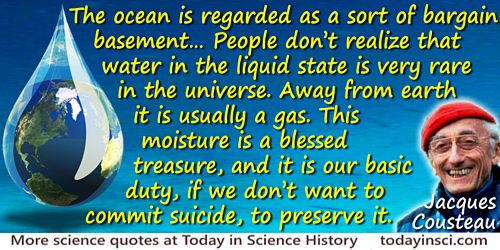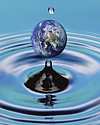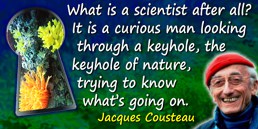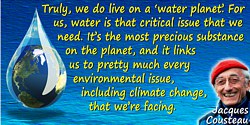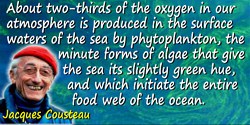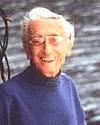 (source)
(source)
|
Jacques-Yves Cousteau
(11 Jun 1910 - 25 Jun 1997)
French naval officer, oceanographer, marine biologist and ocean explorer who co-invented the aqualung, and various equipment for underwater filming of his extensive investigations throughout the world’s oceans.
|
Jacques-Yves Cousteau
“Water in the liquid state is very rare in the universe”
Illustrated Quote - Medium (500 x 250 px)
More Jacques-Yves Cousteau quotes on science >>
This quotes comes from a New York Times article on the occasion of the award of a medal to Jacques Cousteau by the Franklin Institute in recognition of his four decades of contributions to marine biology and oceanography. The article reported Cousteau’s fascination with the ocean life and his philosophy. He expressed his concern about the sea and its future, with this quote concluding the article:
“It is fashionable nowadays to talk about the endless riches of the sea. The ocean is regarded as a sort of bargain basement, but I don’t agree with that estimate. People don’t realize that water in the liquid State is very rare in the universe. Away from earth it is usually a gas. This moisture is a blessed treasure, and it is our basic duty, if we don’t want to commit suicide, to preserve it.”
- Science Quotes by Jacques-Yves Cousteau.
- 11 Jun - short biography, births, deaths and events on date of Cousteau's birth.
- Jacques-Yves Cousteau - context of quote “Bolted to earth” - Medium image (500 x 250 px)
- Jacques-Yves Cousteau - context of quote “Bolted to earth” - Large image (800 x 400 px)
- Jacques-Yves Cousteau - context of quote “Enraptured by the atmosphere of a wreck” - Medium image (500 x 250 px)
- Jacques-Yves Cousteau - context of quote “Enraptured by the atmosphere of a wreck” - Large image (800 x 400 px)
- Jacques-Yves Cousteau - context of quote “Water in the liquid state is very rare in the universe” - Large image (800 x 400 px)
- Jacques Cousteau's Calypso, by Jacques Yves Cousteau. - book suggestion.
- Booklist for Jacques Yves Cousteau.
